A cat that’s throwing up is never something fun to deal with as a pet parent- trust us, we know! However, there are many reasons why this could be the case and serious illness can actually lead to vomiting in cats.
Cat vomit is fairly common, but it’s not necessarily normal. If your cat is vomiting, then it’s worth checking in with your vet as soon as possible to determine the cause.
However, if you can’t get to a vet urgently, then we’re here to help you discover the answer to many of your questions, like the types of vomit and the causes.
But, please remember that you shouldn’t take this advice instead of the vet’s advice – this is just to give you an idea of the possibilities behind why your kitten is throwing up! Let’s take a look!
How Often Do Cats Vomit?
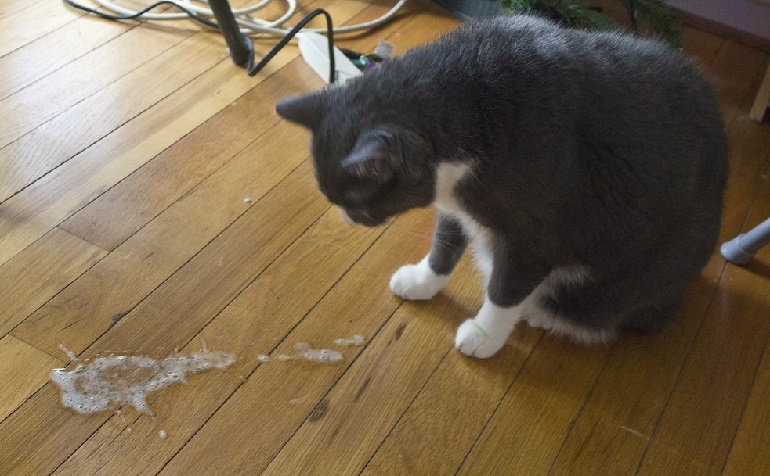
Cats vomit for a variety of reasons which we’ll cover in more detail in a second. But, how often do they actually vomit?
Vets and scientists used to think that some breeds were prone to vomiting, and it just happened. However, we are now aware that chronic vomiting (over a long period of time) may be indicating an underlying problem.
Yes, it’s normal for cats to throw up a hairball every so often but if it’s not related to hairballs, then there could be a problem.
If you find your cat vomiting a few times every day or there’s a significant increase in their vomiting habits, then go see a veterinarian, and they can help you determine the causes of this issue.
Types of Cat Vomit
It’s also important to remember that there are many types of cat vomit. We know this is disgusting to think about!
There’s acute vomiting and chronic vomiting.
Acute Vomiting
Acute vomiting frequently refers to sudden vomiting, for no more than two to three days.
Chronic Vomiting
Chronic vomiting refers to persistent vomiting over a longer period of time and this could have a more serious underlying cause. However, let’s take a quick look at what the difference is between vomiting and regurgitation in cats to help you determine the issue easier.
Vomiting will refer to your cat’s vomit containing the contents of the stomach and upper intestinal tract and being forcefully brought up. Regurgitation on the other hand is the contents of the throat, mouth, and esophagus being brought up.
Causes of Vomiting In Cats
Of course, there are many reasons why your cat’s vomiting. Let’s take a look at some of the causes of your cat’s vomiting.
Eating Too Fast or Too Much Food
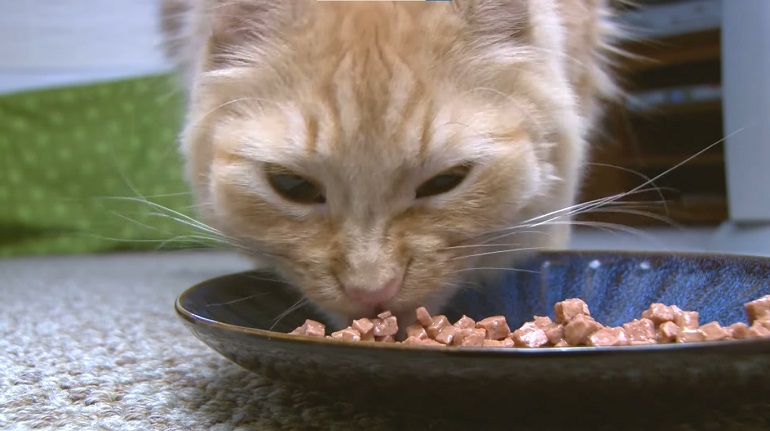
If your cat is frequently vomiting then a reason behind this could be because it’s eating too fast and too much. Don’t worry, this can happen to any healthy cat. You may find that your cat throws up undigested food immediately and barely digested food after eating.
This is a sign that they may be eating too fast or too much and it can have an effect on your cat.
Food Allergies
Food allergies or a food allergy is also another common cause of your cat vomiting. The most common food allergens for cats are the following:
- Fish
- Chicken
- Beef
So if you find your cat vomits after any of these then chances are they are allergic to them. Special diets including a limited ingredient diet can help with cat food allergies.
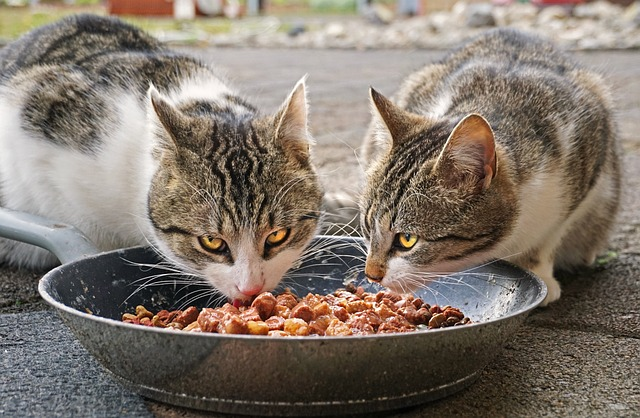
Toxins
Just like humans, cats can also be poisoned through the introduction of toxins. A lot of these can actually be found in your home and so it’s important to be mindful of what your cat is exposed to on a day-to-day basis.
Antifreeze is an example. The toxin found within Antifreeze is Ethylene glycol and it can be very poisonous to cats. So, ensure that any antifreeze spills on your garage floor are cleaned up immediately and kept away from your cat.
Toxic chemicals or toxic substances can also be dangerous. These can be as simple as human medication or garden sprays. So, keep these out of reach!
Feline Inflammatory Bowel Disease
Another reason why continuous vomiting may be a problem for your cat is the underlying problem of feline inflammatory bowel disease. This can have serious implications on your cat’s health.
This could be the underlying cause of your cat’s vomiting and can occur anywhere in the cat’s intestinal tract like the stomach, small intestine, or large intestine.
Feline Diabetes
Feline Diabetes could also be a reason behind your cat’s vomiting and it is an endocrine disease. Vomiting is more often or not a sign that something is up, especially with feline diabetes. If your cat throws up then it’s quite possible that it has diabetes.
Hepatic Lipidosis
Some may also refer to this illness as fatty liver disease and it can be very common. However, it’s not necessarily a direct reason for vomiting but persistent vomiting is known to lead to fatty liver disease.
Drugs
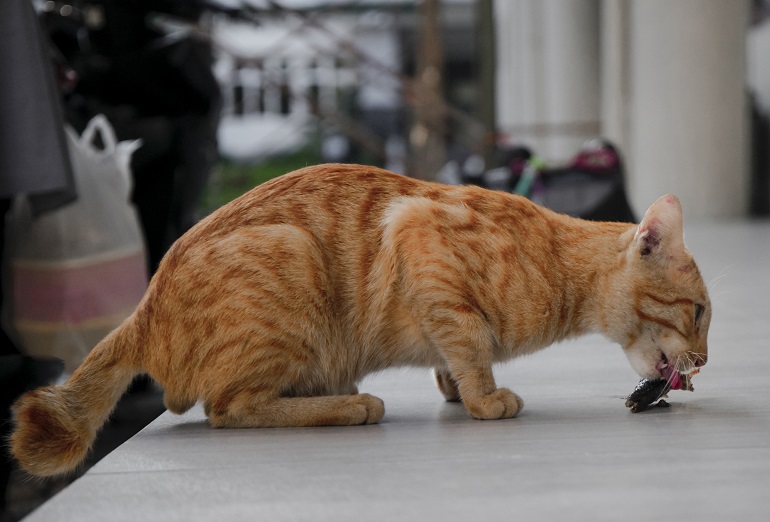
Another common cause of vomiting is any medication they may be prescribed. Not only humans have side effects from drugs but cats can too so it’s important to keep that in mind.
If your cat is having chemotherapy or has antibiotics or anti-inflammatories then you may find that they could vomit as a result of their medication.
Gastric
The cause behind your cat’s vomiting could be the result of gastric problems like gastroenteritis. In simple terms, this is just an upset stomach and can happen to any cat.
This could be a result of dietary indiscretion and other things. Some of these problems will fix themselves however others may need to be addressed by a vet as they could be more serious.
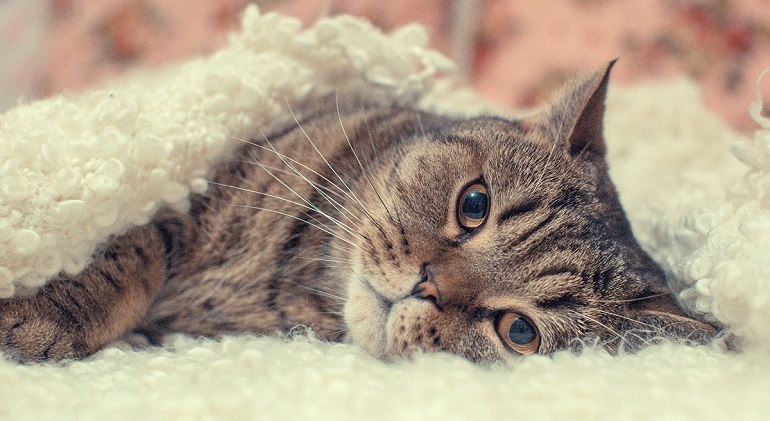
Intestinal
Intestinal issues are also a common underlying cause as to why your cat may be vomiting and so it’s important to consider this too.
Your cat may have somehow ingested foreign bodies which could lead to intestinal problems. Examples of these foreign objects could be things like string, cat litter, or toys. This could cause a large blockage in the intestinal structures, resulting in vomiting.
You may want to reconsider the type of cat litter you are using and opt for one that is not harmful such as pretty cat litter.
This can be very serious so go and see a vet as soon as possible to determine the problem, what’s blocking it, and to fix the issue as soon as possible.
Neurologic
Vestibular disease is an example of the neurological cause behind your cat vomiting. This disease can actually be associated with inner ear disease and can be very uncomfortable for your cat.
You may also find that your cat refuses to use the litter box as much as well as vomiting. It’s vital you take them to a vet the second you think that this could be the cause.
Cancer
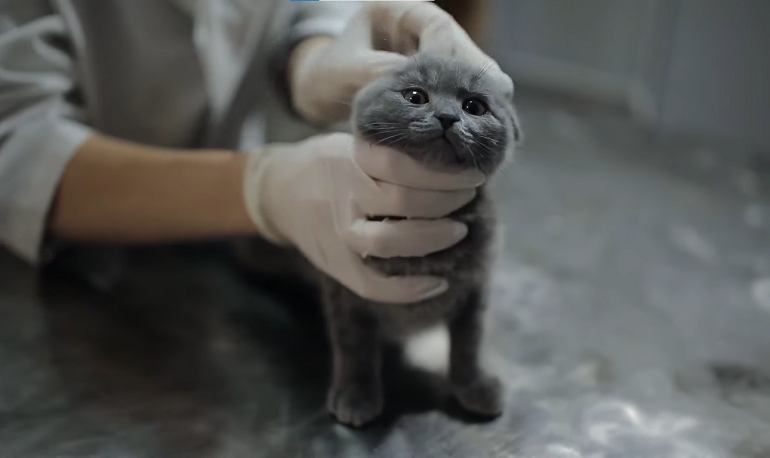
Unfortunately, cats can also suffer from cancers which are increasingly common in their digestive tract. Cancer that invades the digestive tract can lead to vomiting when interference happens with normal digestion patterns.
If your cat is also suffering from cancer in a different part of their body, then it may also suffer nausea, malaise, and discomfort which can lead to vomiting.
Endocrine and Digestive Systems
Hyperthyroidism also known as an overactive thyroid gland could be a reason why your cat may be throwing up in its endocrine system. There are also many other causes such as elevated calcium, diabetes, and ketoacidosis – none of which are fun to suffer.
Diagnosing the Cause of Vomiting
As you can see, there are so many different reasons that your cat might be vomiting such as inflammatory bowel disease, kidney disease or it could be something as simple as an allergy.
But with all these different reasons, how do you know which one is causing your cat to throw up? Have they just eaten too much or is there something more serious going on?
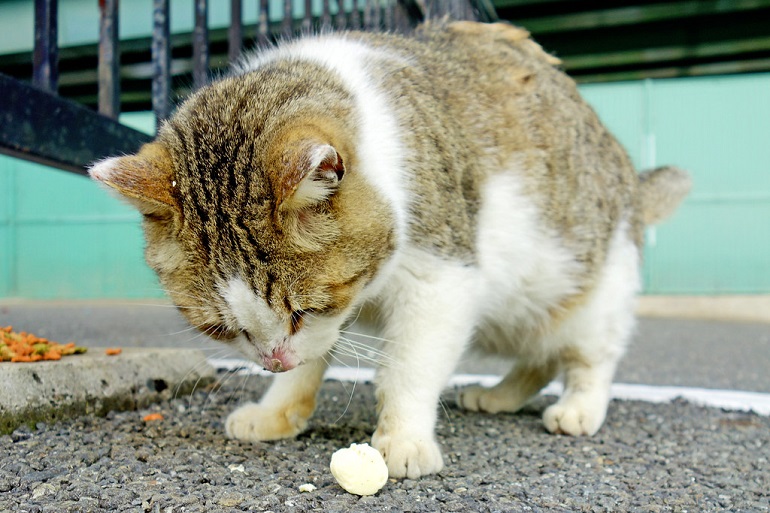
Let’s take a look at some questions your vet might ask to diagnose your cat!
- Has your cat been exposed to any toxins that you know about recently?
- How long have they been vomiting?
- Have there been any changes to their diet?
- Do they hunt regularly?
- Is your cat sitting in their litter box?
- Are they taking any medication?
- Are they eating and drinking like normal?
- Does the vomiting tend to happen after a specific activity?
- Are they losing weight?
- Do they play with any type of wool or string?
This is the best way to figure out what exactly has caused your cat to have an upset stomach but if you can’t get a hold of a vet then there are some things that you can look out for.
Vomit can look very different depending on what has caused it, this is definitely not a completely accurate diagnosis but it might help you narrow down the reasons.
Yellow vomit could mean they are throwing up bile which is a sign of liver disease. Clear or white foamy vomit can be oesophageal regurgitation or an empty stomach.
If you notice blood in their vomit then this could have come from either the stomach, esophagus, or mouth.
If it looks like ground coffee then this is usually an indication of internal bleeding. If there happens to be undigested food in the vomit or your cat vomits barely digested food, then this could indicate an allergy or obstruction.
Testing and X-rays
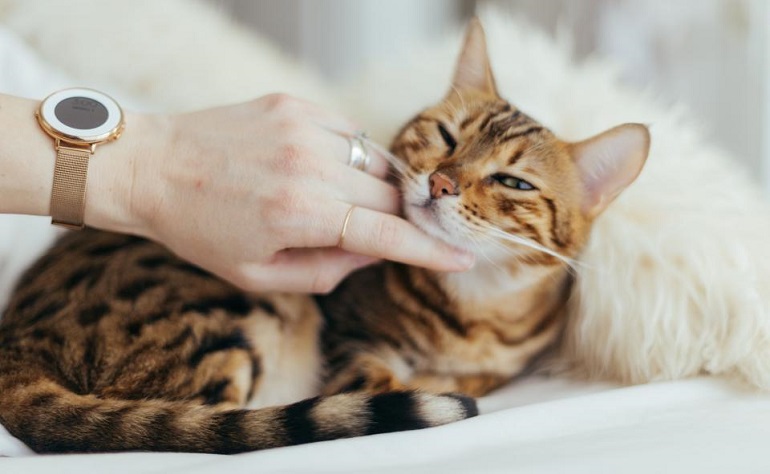
If the vet can’t figure out straight away what’s causing your cat to throw up then they may do some diagnostic testing. This could be a simple x-ray and blood work or something more serious like surgery.
Blood work, x-rays, urinalysis, and abdominal radiographs can reveal all sorts of things like an overactive thyroid gland, chronic kidney disease, or a foreign body.
Unfortunately, it’s not nearly as easy to make a definitive diagnosis for toxin exposure as there is no specific test for it. This is where your knowledge as their owner is vital because it’s much easier to give and treat an accurate diagnosis if the vet knows what specific toxin they’ve been exposed to.
An endoscopy might also be performed if the vet thinks a foreign object might be stuck somewhere but it hasn’t shown up on an x-ray or an abdominal ultrasound. This is also a great way to collect samples from the gastrointestinal tract.
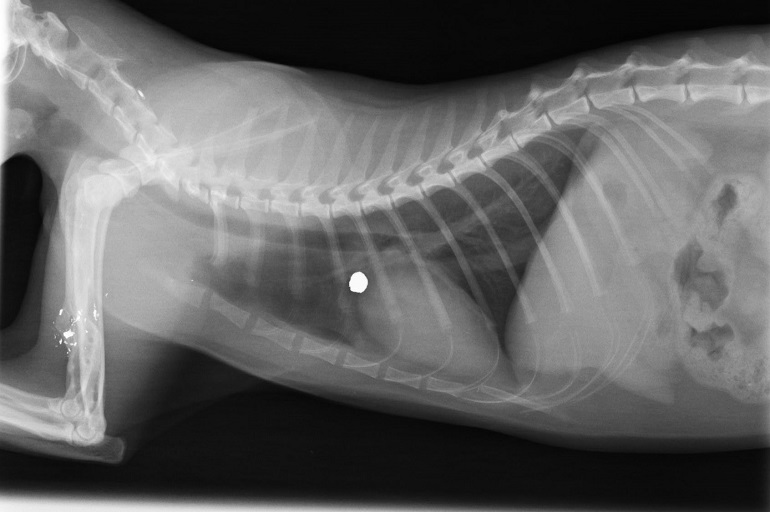
Surgery
In serious cases, if your cat vomits multiple times then surgery might be necessary. This is usually the case if a foreign body has slipped under the radar or if chronic vomiting is happening because of something like inflammatory bowel disease.
Exploratory surgery is preferred by some professionals as it’s an easy way to locate any intestinal foreign bodies although it is a more expensive option when compared to an endoscopy.
Treatments for a Cat Who’s Throwing Up
However, fear not! There are many treatment options for a cat who’s throwing up – we’ve got you covered!
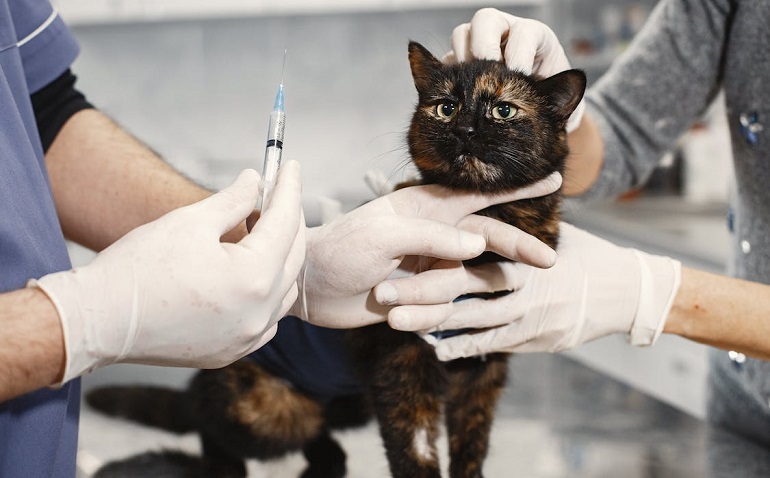
Fluids
One way of treating a cat that’s throwing up is through fluids and increasing fluid intake. You can encourage your cat to drink water which could help flush out their systems and to keep their hydration levels up, decreasing the chance of kidney problems.
Fluid therapy will be given for any type of vomiting in cats and will help overcome muscle weakness and IV fluids are recommended if they’re very dehydrated. Your cat may have to have fluid given to them through a catheter throughout the day if they need IV fluids.
Anti-vomiting Medication
Anti-vomiting medication can also be given to your cat to prevent vomiting – this is an easy way to try and tackle the issue. However, we would still recommend checking them in with a vet just in case!
This medication can help stop the vomiting and help with fluid therapy as it decreases the amount of fluid that’s lost in your cat’s body.
These medications can also help with any abdominal discomfort that your cat may be experiencing. We would also recommend blood pressure medication to help the vomiting but make sure you check this with a vet first.
Diet Changes
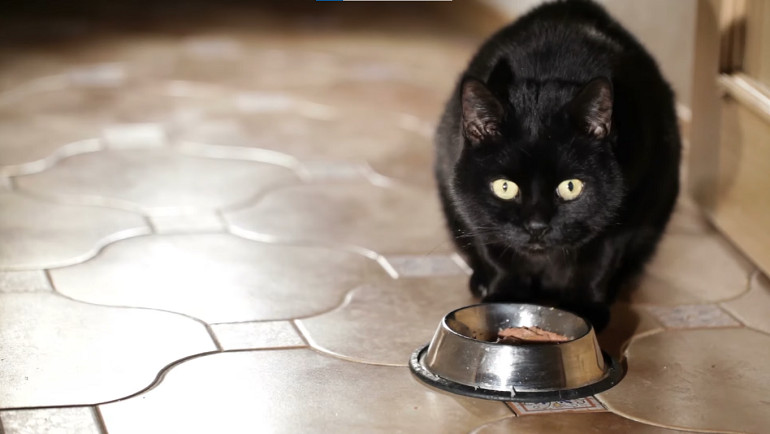
A new diet can also be made in order to prevent vomiting and controlling what your cat eats can help the situation. Feed frequent small meals as a dietary change and ensure they have a balanced diet.
Bland food can also help your cat vomiting or specialized food. However, these foods should only really be used for a few days as they’re not a complete diet for cats.
If the diet change has a positive effect on your cat then you can guarantee that the problem was due to an intolerance, allergy, or bowel disease.
Prednisone
We’ve just mentioned that inflammatory bowel disease could be a cause behind why your cat is vomiting and the treatment for this may include prednisone.
However, this medication can have a lot of side effects that could negatively affect your cat like a weaker immune system. Before taking this option, make sure you’ve had diagnostics beforehand such as blood and x-rays mentioned previously.
Make sure you have an in-depth conversation with your vet about this before giving your cat prednisone!
How to Prevent Vomiting?
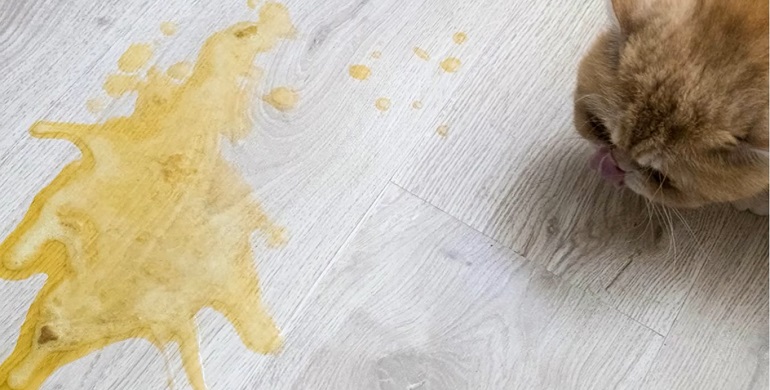
So you’re cats just stopped throwing up and you’ve decided you’d rather not have to clean it up again? well, you’ll be happy to know that there are a few things you can do in order to prevent it from happening again.
An easy change to make is how quickly your cat eats. If you think the vomiting was caused by them eating too fast then try and feed them smaller meals more frequently. You might want to look into an automatic food dispenser if you’re out during the day.
Another trick to stop them from eating as fast is either getting a slow feeder bowl or placing something like a plastic ball in their bowl which means they’ll have to eat around it.
If it was due to an allergy then simply get rid of anything including that allergen.
A high-quality cat brush and hairball-reducing food will also lower the chance of a hairball getting stuck in its digestive system.
Keep any toxins or potentially hazardous items locked away tight so that your cat can’t accidentally get into them while you’re not looking. This will hopefully lower the risk of them getting any sort of poisoning.
Conclusion
So as you can see, there are many different reasons why your cat might be throwing up and some are a lot more serious than others.
Vomiting isn’t exactly normal in cats unless they’re trying to get rid of a hairball, which is why we advise pet parents to visit the vets if they think there might be another reason.
We hope the treatments we’ve given you will help get your cat back to its good old self and that you can prevent frequent vomiting using our preventative methods.
They’re quick and easy and can be done with things you already have at home!












